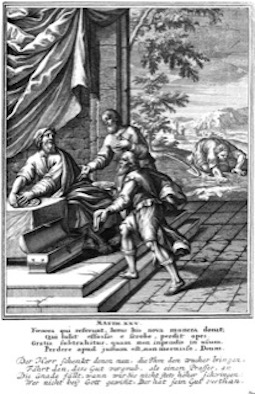Sunday Reflection with Canon Robin Gibbons - 19 November 2023

Thirty-third Sunday in Ordinary Tim
Whatever we might think about the parable of the talents given to the servants, according to their ability in Matthew 25, several things need to be made clear. An immediate observation is that the Master will definitely be returning, that much is made clear, even if the exact time of return is not known! Does that matter? Indeed it does, if we mistakenly identify Jesus and the Master, because there is none of the eschatological expectancy of waiting for a coming that is not known but hoped for, and that requires of each servant a definite faith and a readiness to live each day with that hope.
We cannot metaphorically identify this Master as being in any way an image of Jesus. He is rapacious, someone who reaps where he does not sow, and gathers where he has not scattered seed. He is aggressive in seeking to build up his his estate, doing whatever he can to make a profit. The reprimand he gives to the third servant for failing to invest the money with the bankers, so that he might have gained interest, is a false statement, for in fact this is a practice forbidden in scripture (Exodus 22:25; Leviticus 25:35-38).
Now this also puts a different nuance on the servants' actions. Whilst we might in our own perceptions and from our own culture, commend the actions of the first two as faithful, wise and judicious actions for the good of the Masters wealth, hearers at the time of Jesus would have perceived it differently! In a very real sense that their definition of 'faithfulness' was not to God or the Torah, but to a greedy Master, who did not want to get accused of profiting at someone else's expense, and which in religious circles and in good society was considered shameful behaviour. So in order to get round this, these persons would often delegate their business to slaves, pass the buck so to speak, as slaves were held to a different standard. Richard Rohrbaugh, a commentator in the Biblical Archaeology Review, explains the ancients' reasoning: "Shameful, even greedy, behaviour could be condoned in slaves because slaves had no honour nor any expectation of it." So we have to ask ourselves, is their behaviour an example of the type of 'faithfulness' we ought to emulate?
To confound our expectations we can see that in fact it was the third servant was being faithful, being obedient to the demands of God's Law, whilst the other two servants connived in the master's greed and did what was forbidden. We see it differently being children of a consumer society, investment for us is part of life, we are told so often that it is preparedness for the future. Yet hidden in our own attitude and in this parable is much deeper question: 'What is wealth for?' This Gospel in no way justifies those who uphold that strange concept of prosperity gospel faith, nor does it offer us a way into wealth appropriation, instead it should make us uneasy, for Jesus himself says that we should lend 'expecting nothing in return' (Luke 6:35).
So all in all, this Master, a devious character who is willing to gain money at other peoples expense, challenges any interpretation of the parable that would directly correlate him with Jesus, who does none of these things. But there is also the sheer ridiculousness of the story, we might read five talents as a small sum, whereas in actual fact the true value of a talent was astronomical. Five talents being perhaps the equivalent of 20 years wages for the servant. The story would not have been perceived as a success for the Master or the two servants, for as Rohrbaugh points out … "honourable people did not try to get more, and those who did were automatically considered thieves: To have gained, to have accumulated more than one started with, is to have taken the share of someone else. As the early Christian theologian Jerome would later write: "Every rich person is either a thief or the heir of a thief" (In Hieremiam II.V.2; CCL LXXIV 61). And as Sirach puts it: "A merchant can hardly keep from wrongdoing, and a tradesman will not be declared innocent of sin" (26:29). In other words the whole idea of riches, monetary gain, wealth is challenged at its roots!
So what do we make of it all?
I think the answer is simple and also profound, it calls us to both know our Scriptures much better and also to refrain from using them to justify our own cultural assumptions. It calls us to take the equitable distribution of good as and wealth as something inherent in the Christian message. When we look at this parable through the older eyes, of the culture Jesus knew, it then becomes possible for us to see this master's rapacious behaviour for what it really is!
The nuances of the tale highlight the gentle perceptive humour of Jesus who shows us up for what and who we are, to be in fact hold up a mirror for us to see ourselves not as the two servants, not as the master but far more like the third servant, whose sense of honour and faith was deep, and whose basic observance of life was for the good of others, and not to serve the greed of another.
Isn't that what Jesus means? That to follow him is to march to a different drumbeat?
Lectio
Psalm 128
A song of ascents.
IBlessed are all who fear the LORD,
and who walk in his ways.
2What your hands provide you will enjoy;
you will be blessed and prosper:
Your wife will be like a fruitful vine
within your home,
Your children like young olive plants
around your table.
Just so will the man be blessed
who fears the LORD.
May the LORD bless you from Zion;
may you see Jerusalem's prosperity
all the days of your life,
6and live to see your children's children
Peace upon Israel!
Saint Jerome Letter
Now the perfect servant of Christ has nothing beside Christ. Or if he have anything beside Christ he is not perfect. And if he be not perfect when he has promised God to be so, his profession is a lie. But the mouth that lies slays the soul. Wisdom 1:11 To conclude, then, if you are perfect you will not set your heart on your father's goods; and if you are not perfect you have deceived the Lord. The Gospel thunders forth its divine warning: You cannot serve two masters, Luke 16:13 and does any one dare to make Christ a liar by serving at once both God and Mammon? Repeatedly does He proclaim, If any one will come after me let him deny himself and take up his cross and follow me. Luke 9:23 If I load myself with gold can I think that I am following Christ? Surely not. He that says he abides in Him ought himself also so to walk even as He walked. 1 John 2:6


















